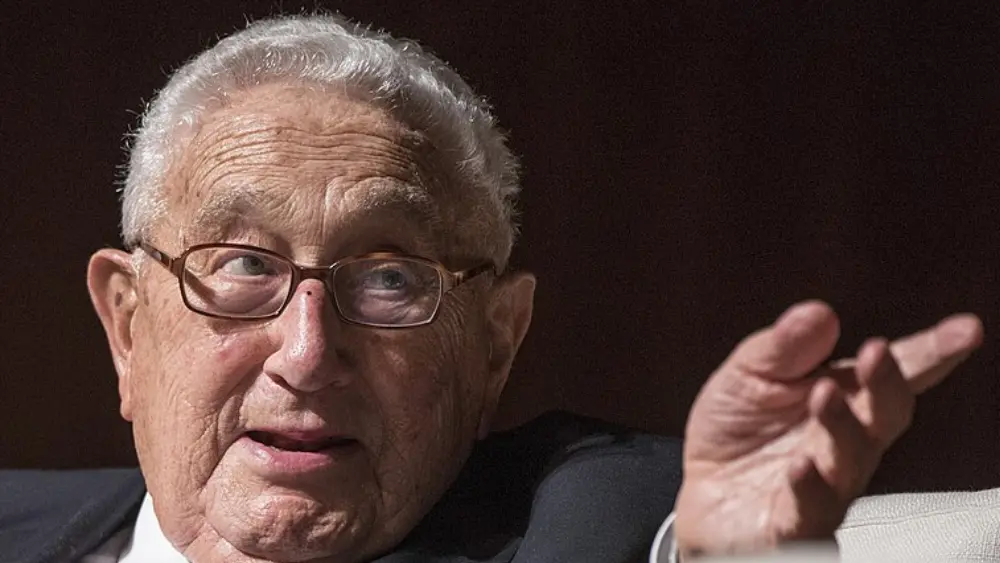Henry A. Kissinger, a renowned diplomat and political scientist, is celebrated for his influential role in facilitating Middle East peace negotiations during his tenure as the United States Secretary of State. Born on May 27, 1923, in Fürth, Germany, Kissinger’s life and career were marked by his expertise in international relations and his efforts to broker diplomatic solutions to complex global conflicts.
Early Life and Academic Pursuits
Henry Kissinger’s formative years were profoundly influenced by his escape from Nazi Germany as a Jewish refugee. Fleeing persecution, Kissinger’s early life fostered his profound appreciation for diplomacy and global cooperation in ensuring peace and stability. As a refugee, his experiences shaped his worldview and approach to international relations, informed by the perils of political turmoil.
Motivated by curiosity, Kissinger pursued academia, culminating in a government doctorate from Harvard University, fueled by global affairs. His academic journey shaped his role in international relations, equipping him with the tools to steer global diplomacy and history.
Henry A. Kissinger: Academic Career and Foreign Policy Analysis
Henry A. Kissinger’s academic focus included foreign policy analysis and the intricacies of global diplomacy, defining his illustrious career. Known for expertise in international relations, Kissinger earned acclaim for his scholarly contributions, gaining recognition in academic circles. His nuanced insights on foreign policy dynamics positioned him as an authority on the challenges of global diplomacy.
During his studies, Kissinger’s research resulted in influential works that greatly impacted the field of international relations. His analyses of historical events and diplomatic strategies reflect his commitment to advancing global politics and conflict resolution understanding. Kissinger’s contributions to foreign policy analysis remain a cornerstone of contemporary scholarly discourse, showcasing his profound impact on global diplomacy.
National Security Advisor and Secretary of State
During Nixon and Ford’s presidencies, Kissinger’s role as National Security Advisor shaped U.S. foreign policy amid global uncertainty. His insights and diplomacy shaped the nation’s approach to international relations, especially during the height of the Cold War. As National Security Advisor, Kissinger executed key initiatives fostering détente and stability during intense ideological rivalries and geopolitical complexities.
After his advisory role, Kissinger became Secretary of State, maintaining significant influence over U.S. foreign policy decisions. In this role, Kissinger shaped America’s diplomacy, promoting dialogue, negotiation, and cooperation on critical global issues with other nations. His diplomatic endeavors with world leaders showcased his commitment to global stability, solidifying his reputation as an influential statesman.
Henry A. Kissinger: Shuttle Diplomacy and the Middle East
Kissinger’s Middle East achievements included pioneering shuttle diplomacy and mediating between Arab nations and Israel for crucial diplomatic breakthroughs. Through his persistent shuttle diplomacy initiatives, Kissinger played a crucial role in fostering a climate of dialogue and negotiation, ultimately laying the groundwork for significant peace agreements and diplomatic milestones in the volatile Middle East.
Kissinger’s commitment to regional stability through shuttle diplomacy reflected his understanding of the Middle East’s complex geopolitical dynamics. His diplomatic interventions and negotiations with key regional stakeholders exemplified his strategic vision and his dedication to resolving entrenched conflicts through dialogue and constructive engagement, leaving a lasting legacy as a pivotal figure in the pursuit of peace and stability in one of the world’s most contentious and volatile regions.
Negotiations and the Yom Kippur War
Henry A. Kissinger’s instrumental role in the negotiations during the Yom Kippur War of 1973 underscored his remarkable diplomatic skills and his capacity to navigate complex geopolitical challenges. During his tenure as Secretary of State, Kissinger brokered vital ceasefires and peace agreements, tirelessly working to de-escalate conflict tensions. His strategic interventions and diplomatic efforts demonstrated his commitment to Middle East stability, solidifying his reputation as a skilled diplomat.
Kissinger’s Yom Kippur War achievements showcased his finesse and unwavering commitment to lasting peace in the Middle East. Facilitating negotiations and promoting dialogue, Kissinger laid the groundwork for peace accords, contributing to a stable regional landscape. Kissinger’s Yom Kippur War diplomacy showcased his enduring impact on Middle East peace, solidifying his legacy in modern diplomatic history.
Camp David Accords
Kissinger’s role in the Camp David Accords of 1978 marked a defining moment in his diplomatic career. Serving as a key intermediary between Egyptian President Anwar Sadat and Israeli Prime Minister Menachem Begin, Kissinger played a central role in facilitating the peace negotiations that ultimately led to the groundbreaking peace agreement. His steadfast commitment to fostering dialogue and promoting mutual understanding between the two nations was instrumental in overcoming longstanding hostilities and forging a path toward a more stable and peaceful regional order.
The Camp David Accords represented a remarkable achievement in the realm of international diplomacy, showcasing Kissinger’s strategic vision and his unwavering dedication to resolving entrenched conflicts through constructive engagement and negotiation. By facilitating the historic peace agreement, Kissinger not only contributed to the establishment of a framework for lasting peace between Egypt and Israel but also left an enduring legacy as a key architect of one of the most significant diplomatic breakthroughs in the modern history of the Middle East.
Henry A. Kissinger: Continued Influence in Diplomacy
Following his tenure as Secretary of State, Henry A. Kissinger maintained a prominent presence in the realm of international relations, leveraging his wealth of diplomatic experience and strategic insights to continue shaping global geopolitical discourse. His continued involvement in diplomatic initiatives and his role as a trusted advisor on critical global issues underscored his enduring influence in the field of international diplomacy. Through his extensive writings, public speeches, and ongoing engagement with world leaders, Kissinger remained a prominent voice in the discussions surrounding complex geopolitical challenges, offering nuanced perspectives and strategic counsel on issues of global importance.
Kissinger’s continued contributions to international relations and his steadfast commitment to fostering dialogue and cooperation among nations solidified his reputation as a preeminent figure in the field of diplomacy. His enduring influence on global affairs reflected his profound understanding of the complexities of international politics and his unwavering dedication to promoting stability and peace on the world stage. By continuing to provide valuable insights and guidance on matters of international significance, Kissinger’s legacy as a distinguished statesman and diplomat continues to shape the course of modern diplomacy and global governance.

Legacy and Impact
Henry A. Kissinger’s lasting impact on global diplomacy is inseparable from his pivotal role in brokering Middle East peace. His legacy as a skilled negotiator and advocate for engagement endures, resonating amid the ongoing pursuit of regional stability. By grasping regional dynamics and promoting dialogue, Kissinger’s role in Middle East peace is a testament to enduring diplomacy’s power.
Beyond the Middle East, Kissinger’s statesmanship and commitment to global cooperation define his influential legacy in international diplomacy. His global impact stems from a profound understanding of international politics and an unwavering dedication to promoting peace and stability. Kissinger’s legacy underscores diplomacy’s importance and skilled negotiation’s pivotal role in shaping modern history and advancing global peace.








